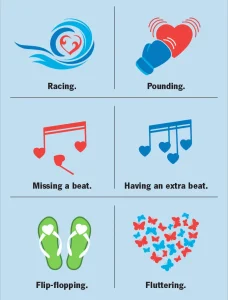Overview
Diagnosis
To diagnose heart palpitations, a healthcare provider begins with a detailed physical examination and listens to the heart using a stethoscope. The provider may also look for signs of other medical conditions that could cause palpitations, such as a swollen thyroid gland. You will likely be asked questions about your medical history, lifestyle, and any medications or supplements you use.
If the provider suspects that the palpitations are related to an irregular heartbeat or another heart condition, several diagnostic tests may be recommended:
-
Electrocardiogram (ECG or EKG): A fast and painless test that records the electrical activity of the heart. Sticky electrode patches are placed on the chest and sometimes the arms and legs. The ECG can detect if the heart is beating too fast, too slow, or irregularly.
-
Holter monitoring: A portable ECG device worn for 24 hours or longer to continuously record heart rate and rhythm during regular daily activities. It helps identify palpitations not captured during a standard ECG. Some smartwatches and wearable devices now offer ECG features—your healthcare provider can advise if this option suits you.
-
Event recording: Recommended when palpitations are infrequent. You wear the monitor for up to 30 days and press a button when symptoms occur to record heart activity during that time.
-
Echocardiogram: A noninvasive test that uses sound waves to create moving images of the heart. It helps detect problems with heart structure or blood flow that could be causing palpitations.
Additional imaging tests such as chest X-rays or advanced cardiac scans may be done if needed to rule out other causes.
Treatment
In most cases, heart palpitations are harmless and do not require medical treatment. If they are not caused by a heart condition, your healthcare provider will likely recommend lifestyle adjustments to avoid known triggers such as:
-
Excess caffeine or alcohol
-
Smoking
-
Stress or anxiety
-
Certain medications or supplements
When palpitations are linked to a heart condition—such as an arrhythmia—treatment focuses on correcting the underlying issue. Depending on the cause, this may include:
-
Medications to regulate heart rhythm or reduce heart rate
-
Procedures such as catheter ablation to correct abnormal electrical signals in the heart
-
Management of other contributing conditions like thyroid disorders or high blood pressure
Early diagnosis and proper management can help prevent complications and ensure that the heart continues to function properly. Regular follow-up with your healthcare provider is essential for monitoring and maintaining heart health.
Advertisement

